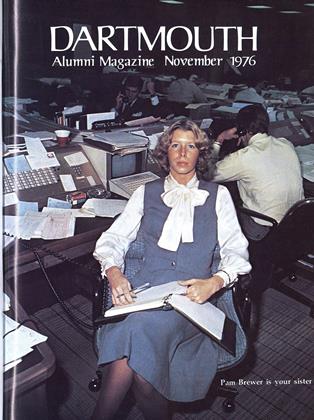The screenplay of The Front by Walter Bernstein '40 - a former Dartmouth reporter and editor-in-chief of the Jack-o-Lantern - is about blacklisted television writers during the early 1950s. Bernstein was among those blacklisted, along with Martin Ritt, the film's director, and two of its stars, Zero Mostel and Herschel Bernardi. Woody Allen plays Howard Prince, a character above suspicion and with no prior writing credits, who places scripts under his name, i.e., "fronts" for blacklisted authors. This was a fairly common practice.
The script gives evidence more of Bernstein's craft and long Hollywood experience than of any personal scores he may have to settle - even though those gray years of the blacklist are more willfully forgotten today than truly purged. The Front tells an absorbing story of a small-time "non-political" survival expert persuaded to front for fun and profit. It builds suspense expertly as his impersonation succeeds so well that he is representing not one but four blacklisted authors and comes to a climax as his little racket is about to be exposed and he must decide whether to save his skin or take some kind of stand. Along the way there are a lot of laughs, but at last they catch in the throat: "comedy," as Bernstein says, "is serious business." The audience at the film's September 25 preview at the Hopkins Center was involved from the start, laughing, hissing, and even cheering at the right moments. It may well be a very big hit, and smart money could predict Oscar nominations for both Woody Allen and Zero Mostel.
If you read Stefan Kanfer's A Journal of thePlague Years (Atheneum, 1973) about the era of the blacklist, you will see how much Bernstein has packed into his story from what Lillian Hellman has called the "scoundrel time." For example, Kanfer describes a club date Mostel was able to get in the Catskills in 1958, after two years of almost no work because of his earlier defiance of the House UnAmerican Activities Committee. He found his fee had been cut in half and "eventually reeled onstage and delivered his entire act in Yiddish, pouring torrents of abuse upon his audience" - who, Kanfer says, "applauded enthusiastically." Bernstein was the one who drove Mostel to that date, and much of the incident is recreated in the film, with a sense of enormous sadness.
I suspect most audiences will experience this, however, as a Woody Allen movie and recapture the history of those times through his particular style. For Allen as pop-character and cult-hero is always getting involved in history and then finding his toe caught in the mousetrap, while he must try to doubletalk ethics with the constabulary. The world he manages to survive in, with his protective coloration of banality, obtuse nervousness, horn-rims, and bald spot, is a world gone mad with philistinism and greed - a world so basically deceitful that to lie back to it is a form of art. Within a Woody Allen film, the Crap is identified and gets cut, even as the girls swarm over him and True Success falls into his lap: 97-pound-weakling as Captain Marvel. Much of this is played out in the part of Howard Prince, even if less manic than Allen's own movies (such as Bananas, Love and Death,Sleeper). He does cut the crap, finally, and does prevail; he utters the existential No, and he gets the girl (played by Andrea Marcovicci), who learns to love a cashier instead of a writer. It's all fun, sort of - exciting and satisfying, at least; as Bernstein admits, the plot has been "romanticized."
Perhaps it will be enough for the kiddies to see the Grand No being said. Bernstein's own moral outrage seems to be leveled at anyone who would keep a craftsman from his work, and the question of ideology is presumed irrelevant. Now he is back at work, and doing what he is best at: producing a Hollywood entertainment. I only hope those who have their memories revived will not have their angers calmed, and those who discover history here will go farther and dig deeper on their own.
Someone asked Bernstein what the industry had done to keep something like the blacklist from happening all over again. "Nothing," he said. Et tu, America?
THE FRONTScreenplay by Walter Bernstein '40Columbia Pictures, 1976
Mr. Gaylord, Professor of English at Dartmouth,will be teaching a course in filmcriticism next spring.
 View Full Issue
View Full Issue
More From This Issue
-
 Feature
FeatureJUST LIKE THE REST OF US
November 1976 By A. KELLEY FEAD -
 Feature
FeatureBibliographical Branding Irons
November 1976 By DAVID WYKES -
 Feature
FeatureThe and the
November 1976 By JAMES L. FARLEY -
 Feature
FeatureFive Deadly Threats
November 1976 By John G. Kemeny -
 Article
ArticleEight-y!
November 1976 -
 Article
ArticleAlan versus Them 'It would be boring otherwise'
November 1976 By PIERRE KIRCH'78
Books
-
 Books
BooksCOLLECTED POEMS 1930-1960.
February 1961 By ALEXANDER LAING '25 -
 Books
BooksIDEOLOGIES AND UTOPIAS: THE IMPACT OF THE NEW DEAL ON AMERICAN THOUGHT.
JANUARY 1972 By ELMER E. Smead -
 Books
BooksWINE AND YOU.
OCTOBER 1970 By John Hurd ’21 -
 Books
BooksSTRUCTURAL PRINCIPLES IN OLD ENGLISH POETRY.
JANUARY 1969 By L. DEAN PEARSON -
 Books
BooksAttentive Eye, Attentive Ear
November 1983 By Peter Smith -
 Books
BooksHIGHLIGHTS OF MODERN LITERATURE.
May 1954 By RICHARD W. MORIN '24

